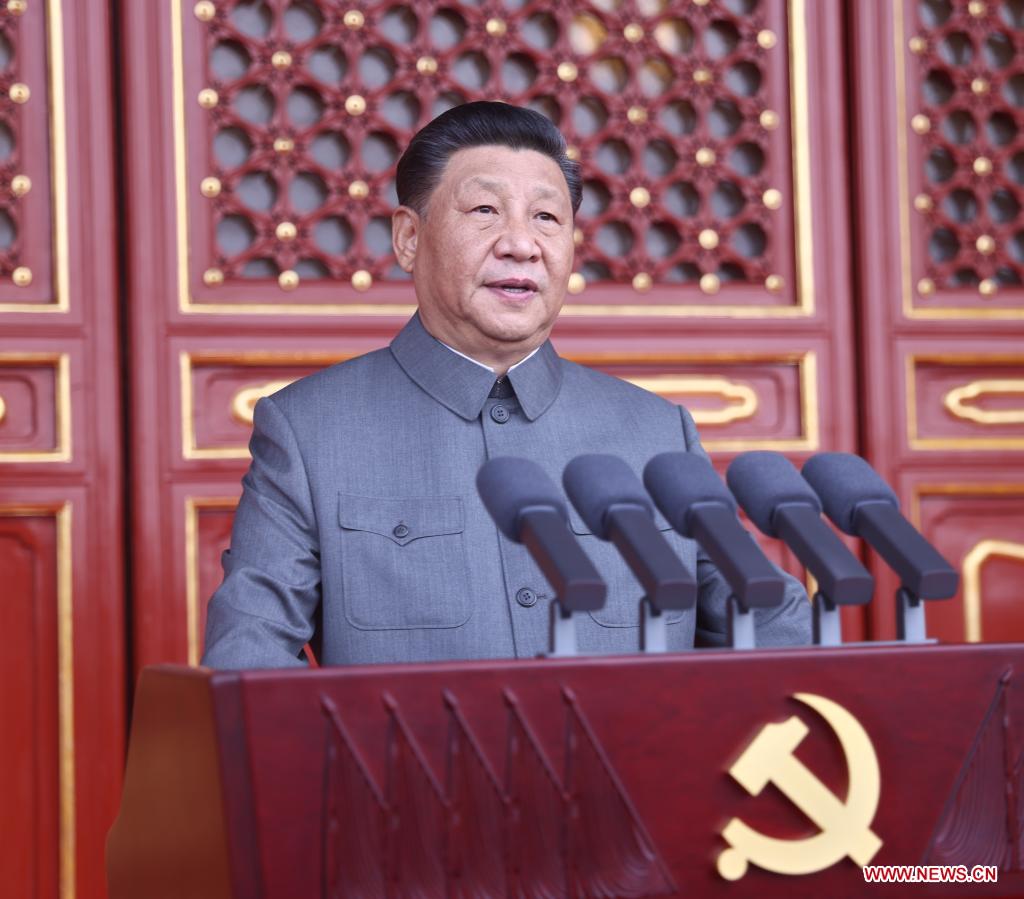
Xi Jinping, general secretary of the Communist Party of China (CPC) Central Committee, Chinese president and chairman of the Central Military Commission, delivers an important speech at a ceremony marking the centenary of the CPC in Beijing, capital of China, July 1, 2021. (Xinhua/Ju Peng)
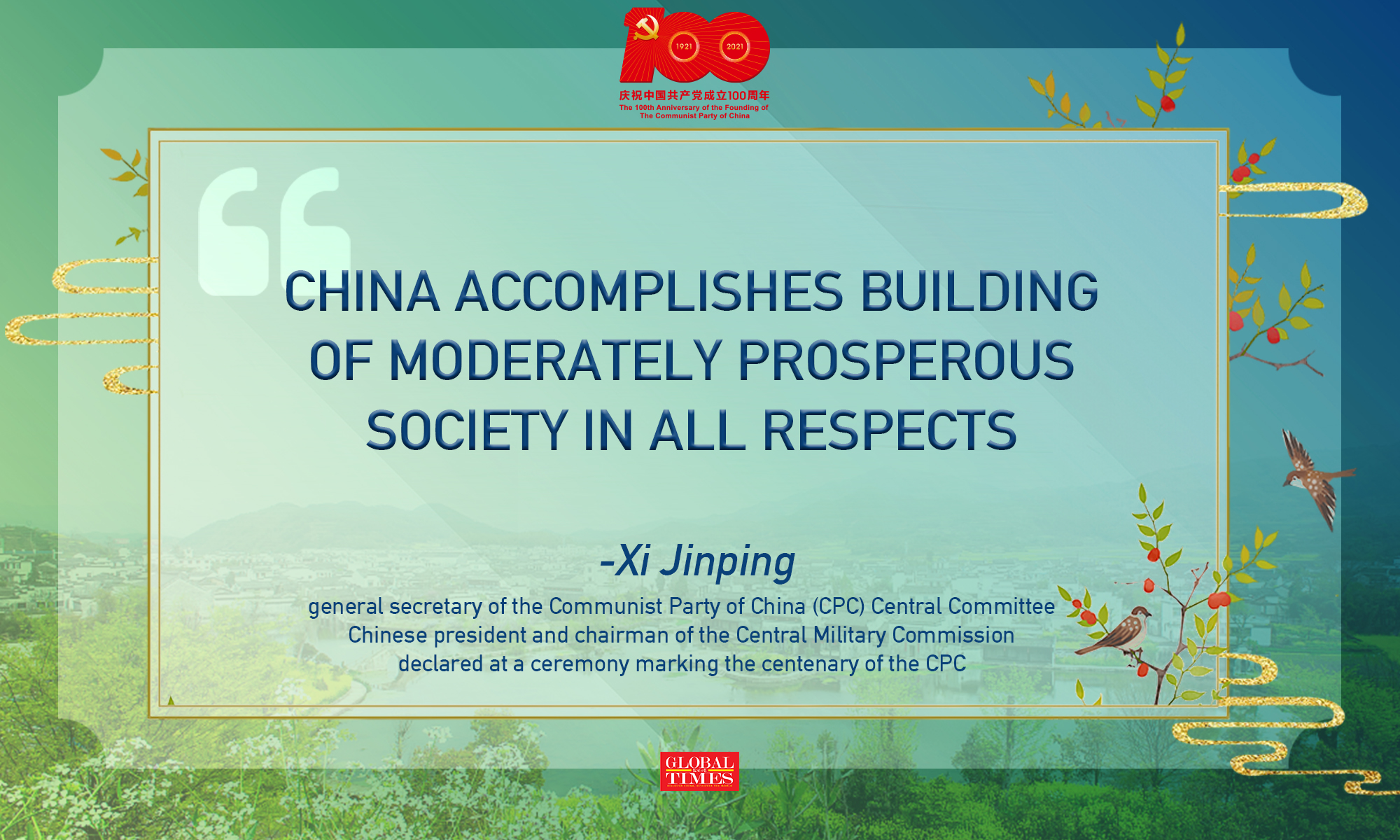
Graphic: GT
At a grand ceremony to commemorate the 100th anniversary of the founding of the Communist Party of China (CPC) in Beijing on Thursday, Xi Jinping, general secretary of the CPC Central Committee, solemnly declared the completion of the goal of building China into a moderately prosperous society in all respects, marking the culmination of a 2,500-year journey of the Chinese people to pursue xiaokang - a peaceful and happy life, a century of earnest endeavor by the CPC and over four decades of relentless government efforts and Chinese ingenuity.
The decisive voice of Xi when he made the declaration at the very beginning of his speech and the loud and lasting cheers from the crowd on the Tiananmen Square that was immersed in a festive atmosphere underscored the pride and exhilaration of the entire Chinese nation over the magnificent and hard-fought achievement reached with the blood and sweat of generations of Chinese. The historical weight of the announcement at such a historical moment cannot be overstated.
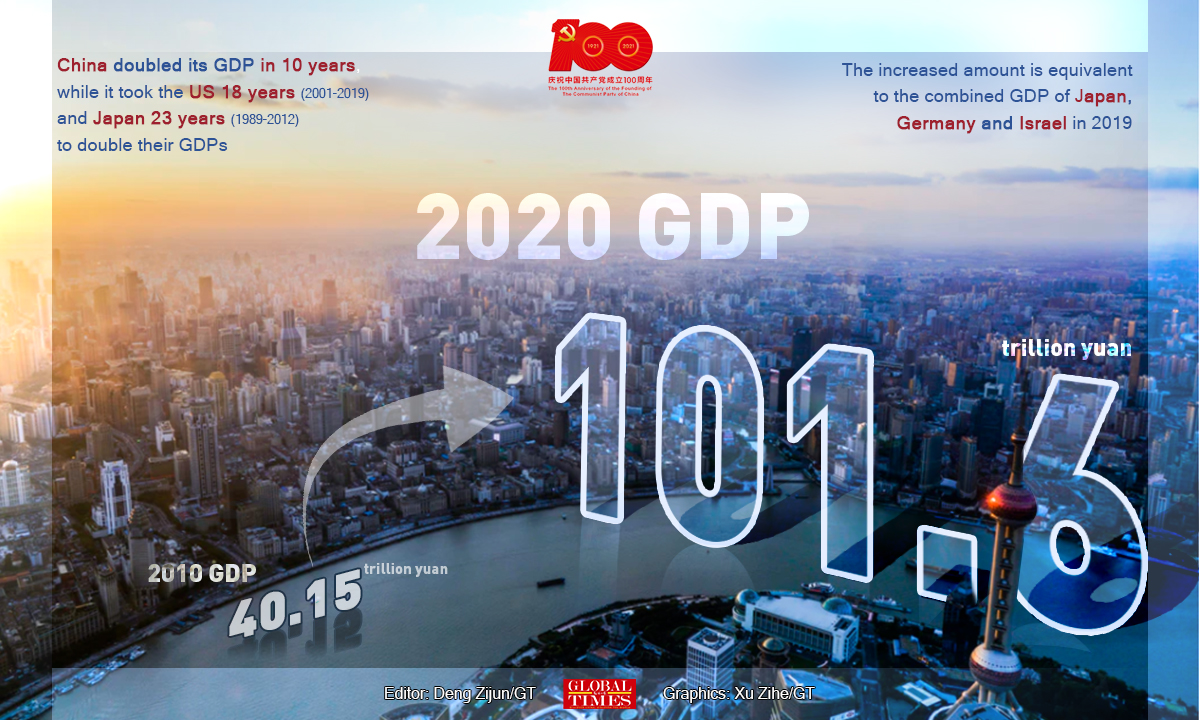
Graphic: GT
The achievement is truly a milestone in almost every regard, and befitting the once-in-a-century occasion where a slew of achievements was highlighted by Xi, who is also Chinese president and chairman of the Central Military Commission. The objective contains a sweeping set of goals ranging from economic growth and political reform to environmental protection, but several breakthroughs shed further light on the historical significance of the mission.
In the four decades or so since building a xiaokang society became an official goal for China's social and economic development, China's economy outstripped what were once considered economic miracles in Germany, Japan and South Korea by leaps and bounds and is closer than ever to overtake the US No.1 spot in economy, which it has held for 120 years. China lifted 770 million people - roughly the equivalent of the combined population of the US, Indonesia and Pakistan (the world's third, fourth and fifth most populous countries) - out of poverty.
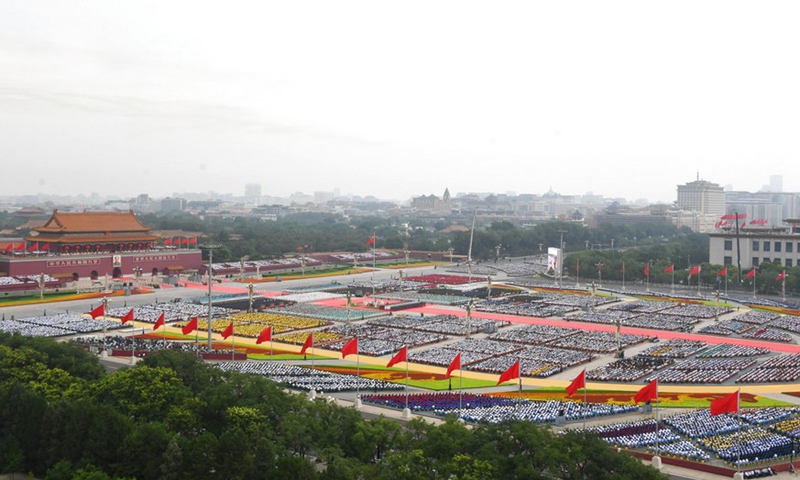
A ceremony marking the centenary of the Communist Party of China (CPC) is held at Tian'anmen Square in Beijing, capital of China, July 1, 2021.(Photo: Xinhua)
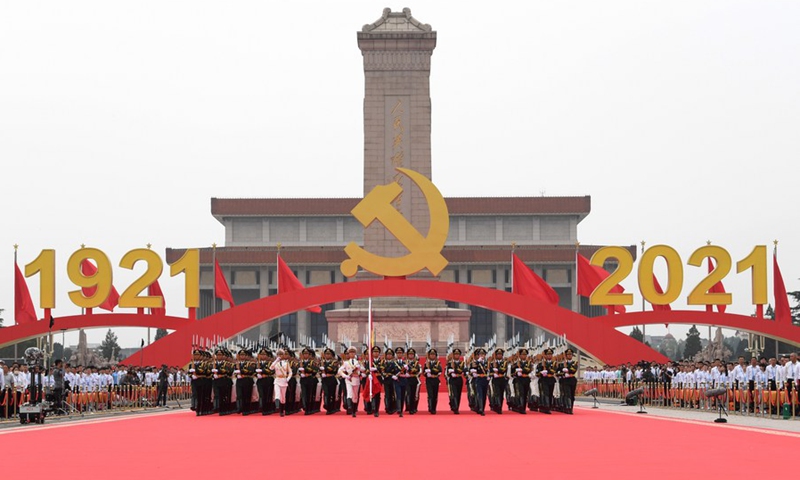
The national flag guards march during a flag-raising ceremony at a grand gathering celebrating the centenary of the Communist Party of China (CPC) at Tian'anmen Square in Beijing, capital of China, July 1, 2021.(Photo: Xinhua)
A confluence of factors contributed to such an achievement unparalleled in human society, but chief among them is the people-centered governance and the excellent policymaking and execution of the CPC, officials, economists and ordinary Chinese people said. Declaring the completion of the goal on such an important occasion is not just aimed at celebrating the remarkable achievements of the past but also inspiring confidence and unity as China embarks on a higher mission to build a modern socialist power amid challenges and uncertainties, they noted.
"By any measurement, the goal has not only been completed but actually surpassed," Cao Heping, a professor of economics at Peking University in Beijing, told the Global Times. "There are countless standards, but the bottom line is that the Chinese people now live a life that they didn't even dare to imagine just four decades ago."
The dream of a peaceful and happy life actually started 2,500 years ago, when the term xiaokang, which translates into "a moderately prosperous society," first appeared in ancient Chinese classic shijing ̶ "the Book of Poetry."
The concept was revived in 1979, when the late Chinese leader Deng Xiaoping used the term to describe the goal of China's social and economic development during a meeting with then Japanese Prime Minister Masayoshi Ohira.
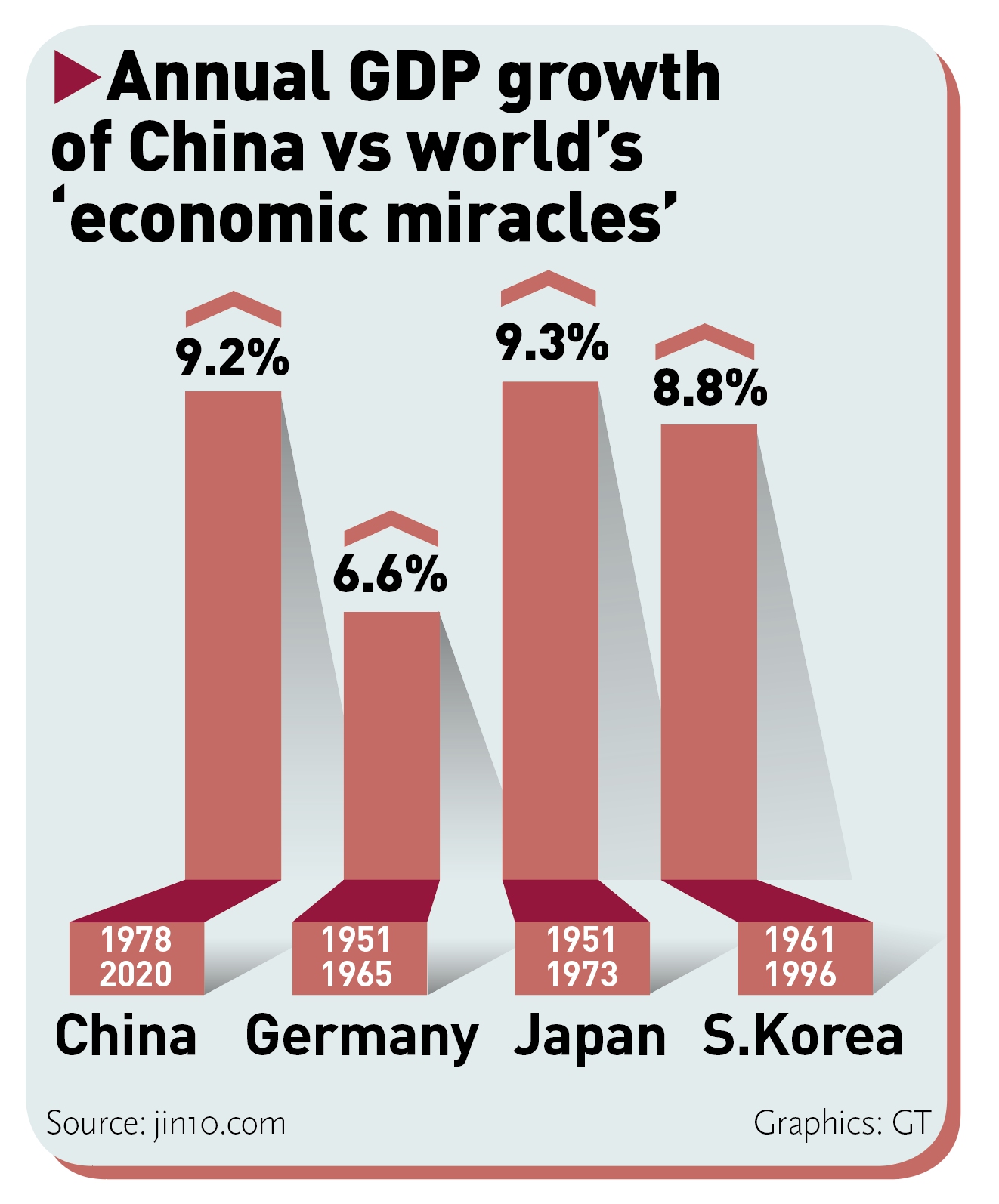
Graphic:GT
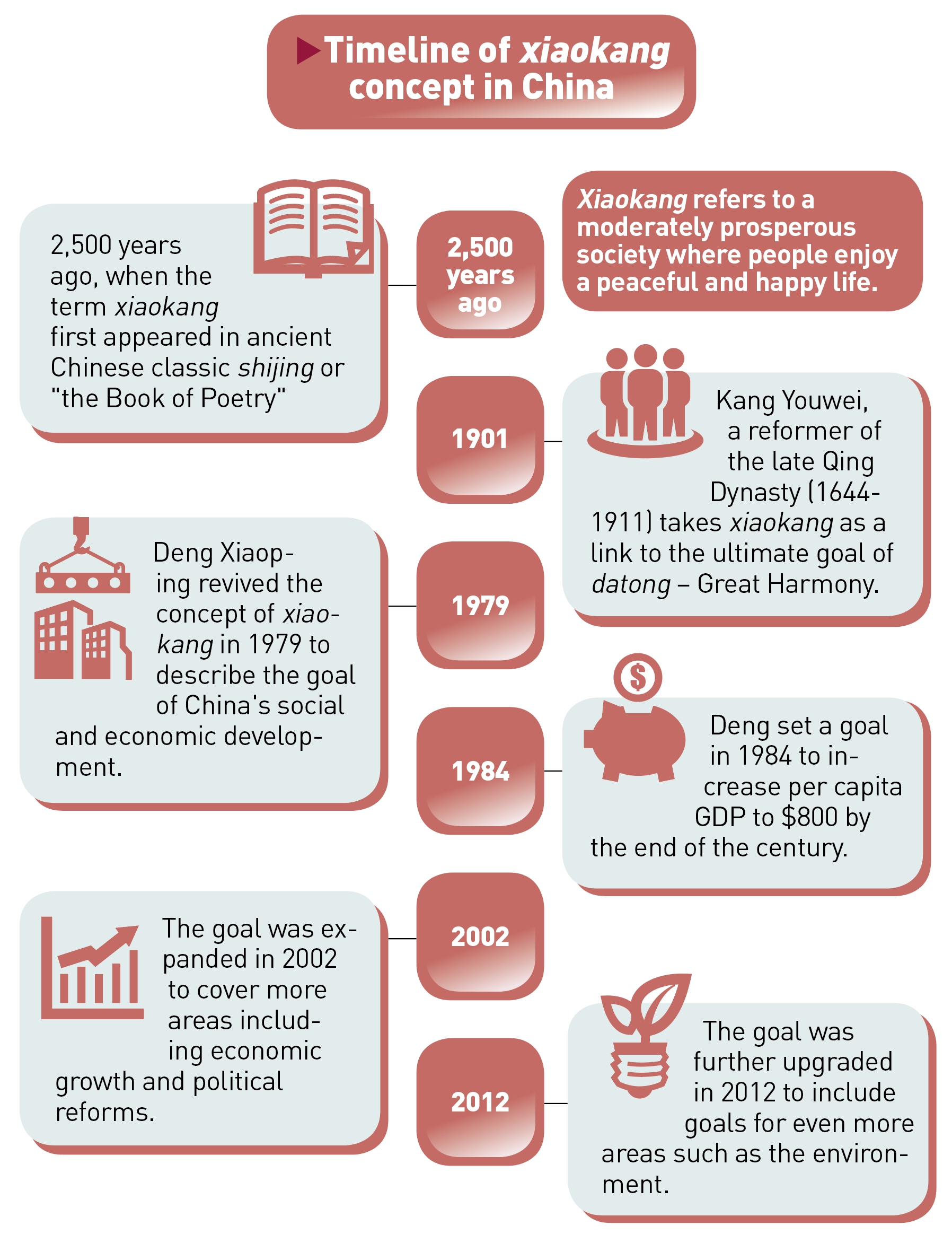
Graphic:GT
Over time, the concept has been refined and upgraded and has become the overarching goal of China's social and economic development. In 1984, Deng set a specific goal to increase per capita GDP to $800 by the end of the century. The goal was expanded in 2002 to cover more areas such as economic growth and political reforms, and was further upgraded in 2012 to include goals for even more areas such as the environment.
One of the most closely watched targets set in 2012 was the numerical goal of doubling 2010's GDP and per capita income for both urban and rural residents by 2020. Despite disruptions from the COVID-19 outbreak in 2020, China's GDP reached 105.6 trillion yuan ($14.72 trillion), more than double the roughly 39.8 trillion GDP in 2010. The goal for doubling per capita income was also surpassed, with per capita income reaching 43,834 yuan for urban residents and 17,131 yuan for rural residents.

The Beijing skyline Photo: VCG
Beyond the statistics are the palpable improvements in people's lives.
Until the reform and opening-up in 1978, although the living standards of urban residents had improved significantly, they generally still struggled to get enough food and clothing. A 54-year-old Beijing resident surnamed Li recalled that his family's income was less than 300 yuan in 1988, and the biggest expenditure was food, which, along with utilities, could take up a big chunk of their income.
But after the reform and opening-up policies were carried out, Li, who was a management-level worker in the media industry, said his income started to increase each year. "My salary is rising every year, and so is my wife's, and my income even stood at 10,000 yuan one month in 2000," Li said, adding that his family could afford a refrigerator and even a car at that time.
While Li is among the more affluent group of Chinese, such improvements are commonly seen elsewhere. The Engel coefficient of urban residents, which measures the proportion of income spent on food, dropped to a record low of 27.7 percent in 2018 from 57.5 percent in 1978, according to latest official data. The lower the reading indicated, the greater the affluence.
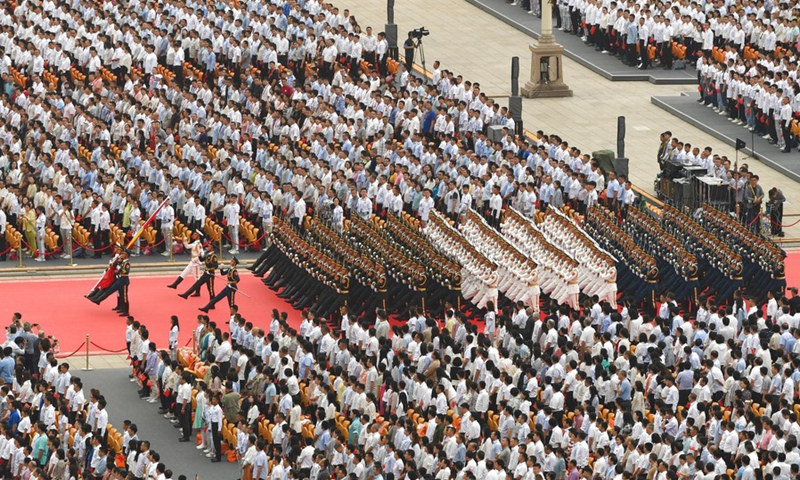
The national flag guards march during a flag-raising ceremony at a grand gathering celebrating the centenary of the Communist Party of China (CPC) at Tian'anmen Square in Beijing, capital of China, July 1, 2021.(Photo: Xinhua)
Unmatched success
For the country's rural areas, the biggest hurdle for reaching xiaokang was extreme poverty that had lasted for generations. The CPC started a battle against poverty and declared victory in 2020, lifting 770 million people out of absolute poverty - that's over twice the size of the US population of roughly 331 million, and accounting for 70 percent of the global population that has been lifted out of poverty.
"The significant improvement in living standards for people is the most important part of the xiaokang goal," Liu Ying, research fellow at the Chongyang Institute for Financial Studies at Renmin University of China in Beijing, told the Global Times.
Still, Liu added, China has made unprecedented achievements in many respects. "In terms of GDP growth and scale, there is definitely no precedent in history for what China has achieved," she said.
There is no dispute over China's economic success on a global scale. Since 1978, China's GDP growth averaged over 9.2 percent annually for 42 years. That outstrips a 6.6 percent annual growth for 15 years in Germany during a period known as the Miracle on the Rhine starting 1951, or an 8.8 percent annual growth for 36 years in South Korea's Miracle on the Han River, according to news portal jin10.com. Japan maintained a higher 9.3 percent annual growth during the "Japanese economic miracle" but only for 23 years.
"Considering all the factors, including vastly different population sizes and national conditions, there is simply no comparison," Cao said, "China's economic development defied long-perceived economic theories on how a country can grow from an underdeveloped one to a developing one toward being a developed one."
How China achieved this has been a widely discussed question in recent years and especially during the centennial of the CPC. Countless historical and economic factors have been raised, but the single deciding factor that many had pointed to is the leadership of the CPC.
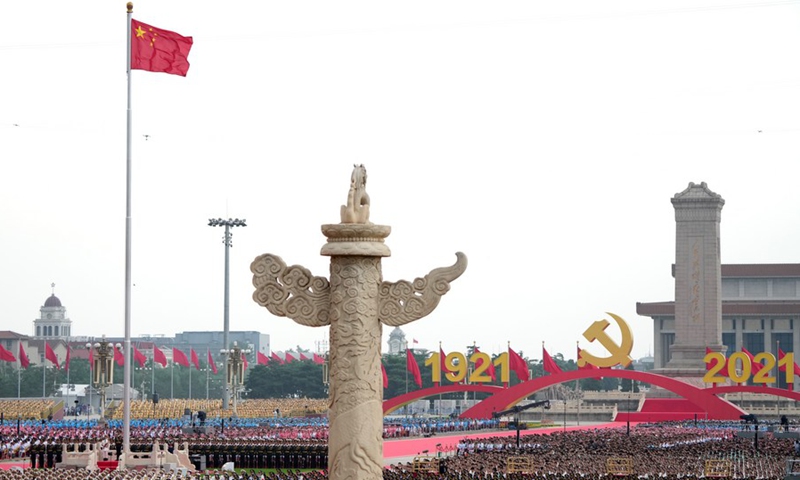
A ceremony marking the centenary of the Communist Party of China (CPC) is held at Tian'anmen Square in Beijing, capital of China, July 1, 2021.(Photo: Xinhua)
CPC leadership
"Building a moderately prosperous society in all respects has been a fighting goal for the Chinese people for thousands of years and it has been realized under the leadership of the CPC," Shen Xiang, a Party member and local official in Liangshan Yi Autonomous Prefecture, Southwest China's Sichuan, told the Global Times.
Shen, who was a frontline worker during the battle against poverty in one of the poorest areas of the country before the victory was declared in 2020, said that it was the CPC's people-centered governance, coordinated development and original mission for common prosperity that had made the achievement possible.
"It is the embodiment of the superiority of socialism with Chinese characteristics," Shen said, expressing his pride in the Party's success and his confidence that the CPC will continue to lead the Chinese people to greater heights.
Inspiring confidence and unity was also a key theme of the nationwide celebrations of the centennial of the CPC and, in particular, of the declaration of completing the xiaokang goals on Thursday, Cao said.
China has already announced new goals for the 14th Five-Year Plan (2021-25) and Long-Range Objectives through the Year 2035, including turning China into a high-income country and ultimately a modern socialist power.
"It is also a reminder for the country of our long-term goal of great rejuvenation and a message of confidence and unity that we can and we will reach even higher goals," Cao said, but reminding that many challenges and uncertainties remain on the path forward.
The message was loud and clear for millions of people around the country like Shen, who halted work and watched the ceremony on Thursday morning.
"In the new journey, I believe that there are countless ordinary CPC members like me who are energized and ready to work toward the realization of the great rejuvenation of the Chinese nation," Shen said.
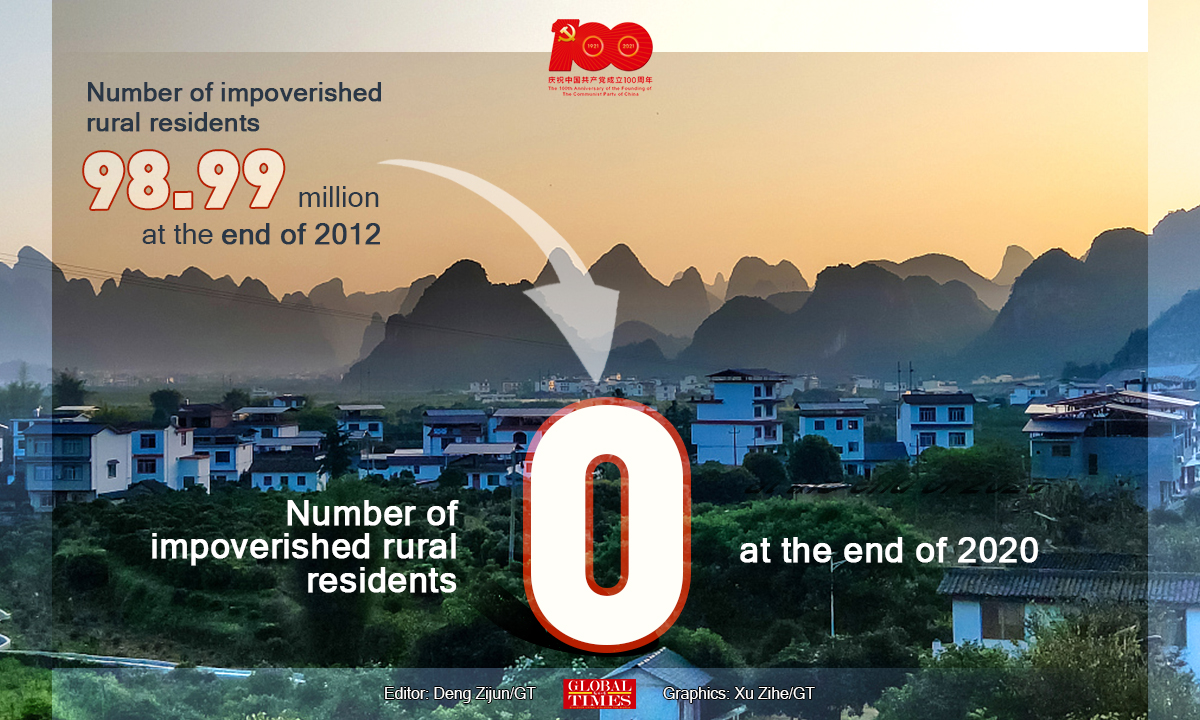
Graphic: GT
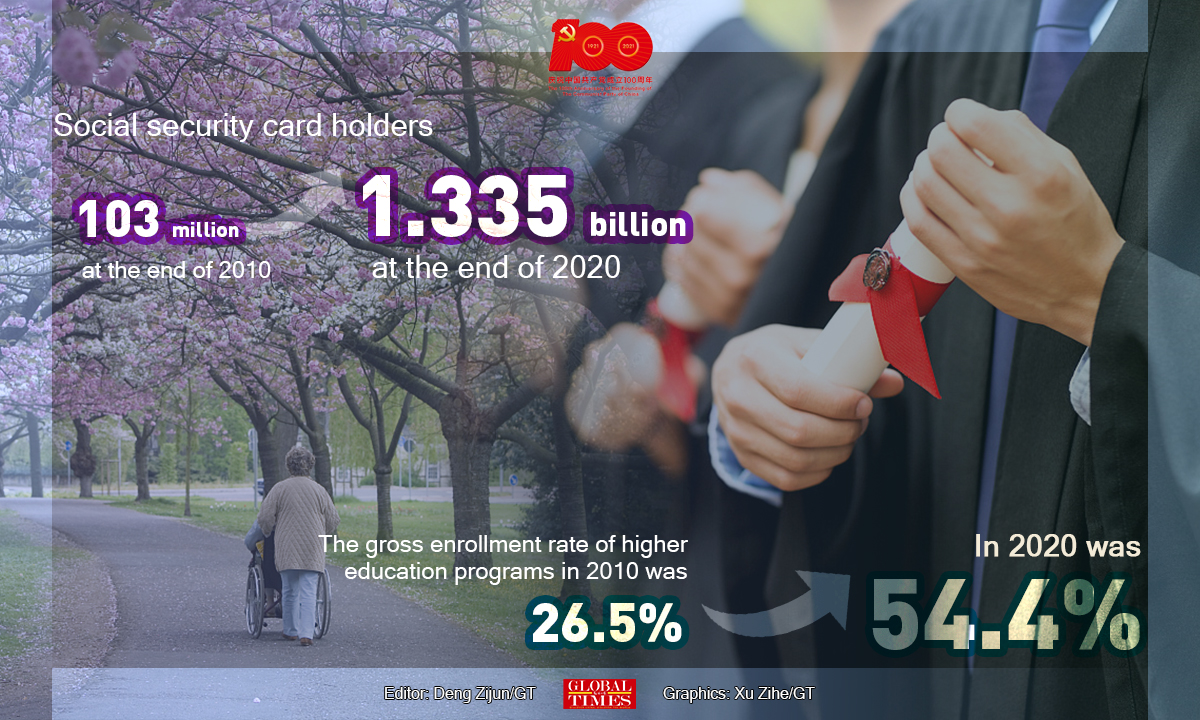
Graphic: GT
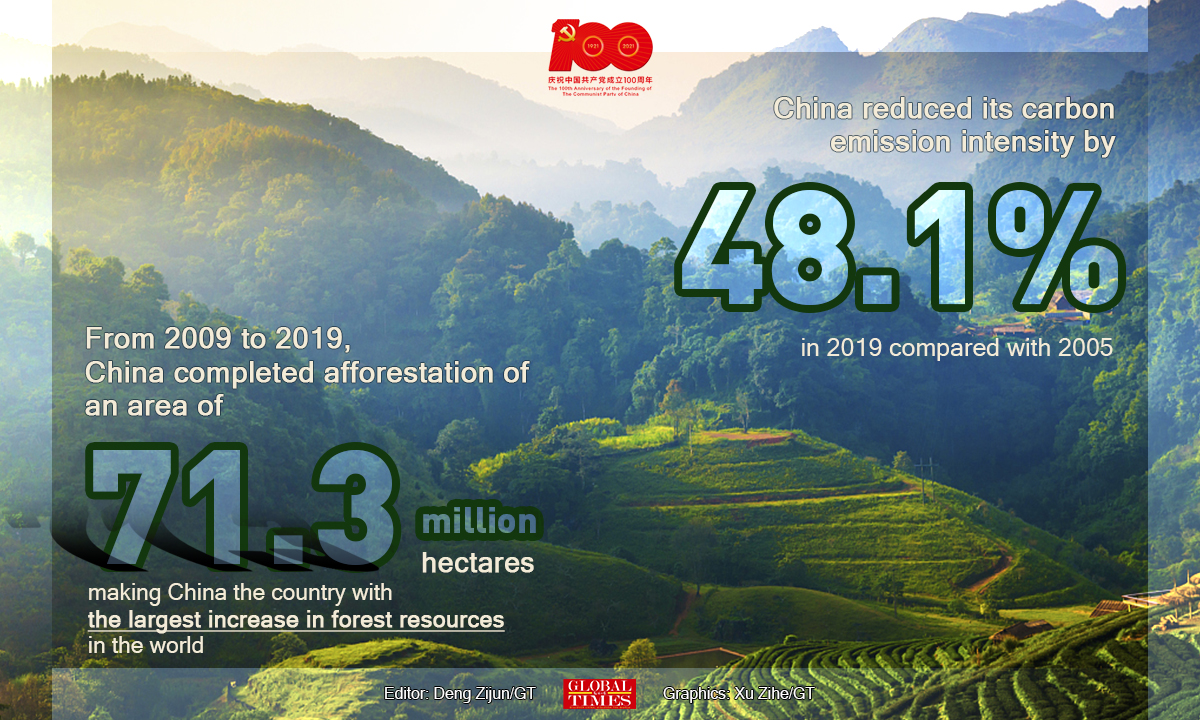
Graphic: GT




